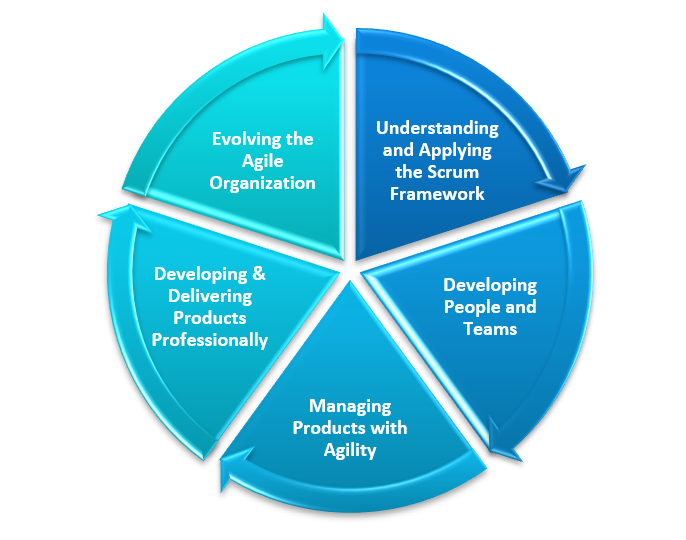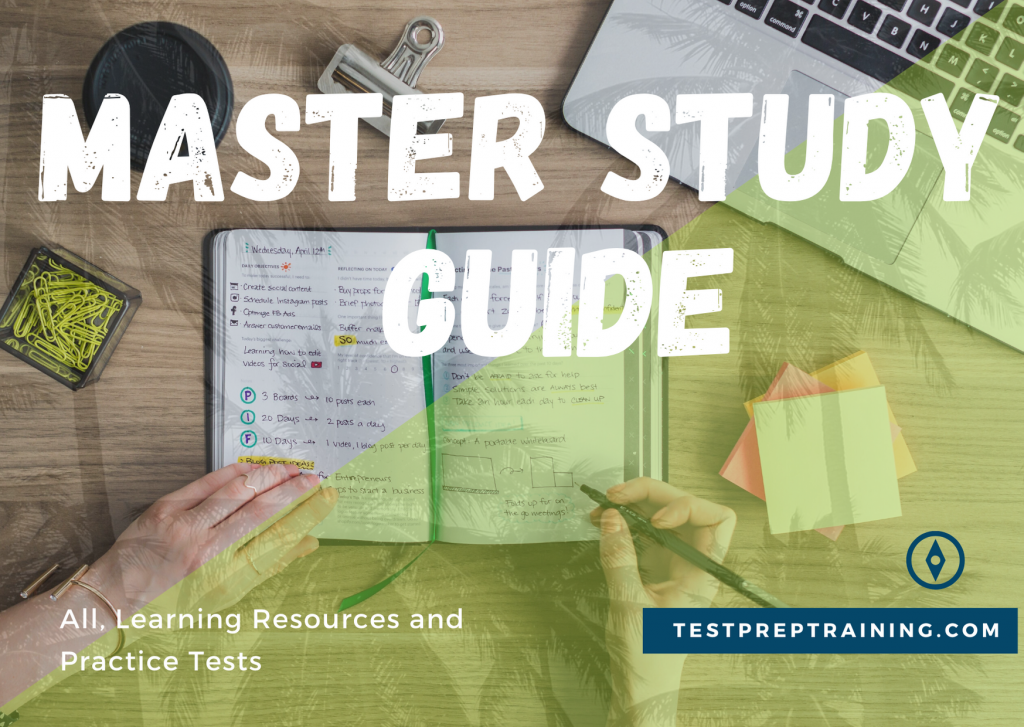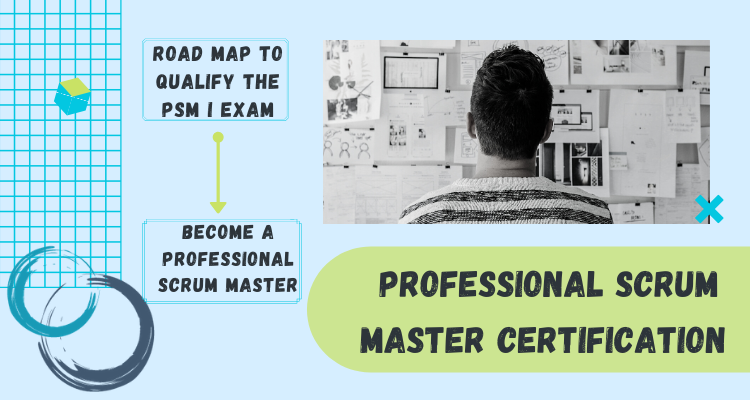The Professional Scrum Master (PSM I) Certification is provided by Scrum.org to people who prove they understand and can use the Scrum framework effectively in real-life situations. Here’s some information about the PSM I certification:
Exam format: The PSM I test is done online and includes 80 multiple-choice questions. Test-takers have 60 minutes to finish it and must achieve a minimum score of 85% to pass.
Exam content: The PSM I exam includes questions about the Scrum framework’s basic principles, how it’s based on empirical processes, what the Scrum Master’s role involves, the Scrum events, the things created in Scrum (artifacts), and the rules that tie them all together.
Professional Scrum Master (PSM I) Exam Glossary
Here are some terms related to the Professional Scrum Master (PSM I) Certification exam that you may encounter:
- Agile Framework: An Agile framework is a structured way to handle complicated projects that highlights working together, cooperation, and making progress in small steps toward a clear goal.
- Scrum Master: The role responsible for facilitating the Scrum framework, including guiding the team through the Scrum process, ensuring Scrum events occur, and removing obstacles that impede the team’s progress.
- Product Owner: The role responsible for representing the interests of the stakeholders, creating and prioritizing the Product Backlog, and ensuring the team delivers maximum value to the stakeholders.
- Development Team: A team of experts in charge of providing a part of the product that could be released by the end of each Sprint.
- Sprint: A time-boxed iteration of 1-4 weeks during which a potentially releasable increment of the product is created.
- Sprint Planning: A meeting at the start of a Sprint where the team picks what tasks to do from the Product Backlog, and makes a plan to reach the Sprint Goal.
- Daily Scrum: A 15-minute time-boxed event where the Development Team meets to synchronize their work, identify any obstacles, and plan the work for the next 24 hours.
- Sprint Review: An event that marks the end of a Sprint where the team demonstrates the work completed during the Sprint and receives feedback from stakeholders.
- Sprint Retrospective: An event that marks the end of a Sprint where the team reflects on their performance, identifies improvements, and updates their process for the next Sprint.
- Product Backlog: An ordered list of all the work that needs to be done on the product, often prioritized by value, risk, and necessity.
Professional Scrum Master (PSM I) Exam Guide
Here are some official resources to help you prepare for the Professional Scrum Master (PSM I) Certification exam:
- Scrum.org: This is the official website for Scrum.org, the organization that offers the PSM I Certification exam. It provides a wealth of information about Scrum, including free Scrum Guides, assessments, and training courses.
Link: https://www.scrum.org/
- Scrum Open Assessment: This is a free online assessment that can help you evaluate your understanding of Scrum. This test has 30 multiple-choice questions and is built upon the Scrum Guide. It’s a useful way to check if you’re prepared for the PSM I Certification exam.
Link: https://www.scrum.org/open-assessments/scrum-open
- Scrum Glossary: This is a comprehensive glossary of Scrum terminology that you may encounter while preparing for the PSM I Certification exam. It provides definitions of common terms and concepts, and can help you develop a solid understanding of Scrum.
Link: https://www.scrum.org/resources/scrum-glossary
- Scrum Master Learning Path: This is a learning path that includes a variety of free resources to help you prepare for the PSM I Certification exam. It includes courses, articles, and videos that cover key Scrum concepts and practices.
Link: https://www.scrum.org/pathway/scrum-master
- Scrum Master Practice Exam: This is a paid practice exam offered by Scrum.org. It consists of 80 multiple-choice questions and is designed to simulate the actual PSM I Certification exam. It’s a great way to evaluate your readiness and identify areas for improvement.
Link: https://www.scrum.org/resources/scrum-master-practice-assessments
Professional Scrum Master (PSM I) Exam Tips and Tricks
Here are some tips and tricks that can help you prepare for the Professional Scrum Master (PSM I) Certification exam:
- Understand the Scrum Framework: The PSM I Certification test is all about the Scrum framework, so it’s crucial to really grasp its roles, events, things created, and values. Go through the Scrum Guide carefully and practice using Scrum principles in real-world situations.
- Take Practice Tests: Scrum.org provides free practice tests on its website to help you check your knowledge of Scrum and find areas where you can get better. Try as many practice tests as you can to get used to the exam style and the kinds of questions asked.
- Focus on the Basics: The PSM I Certification exam is designed to test your understanding of the basics of Scrum. So, focus on mastering the fundamentals and don’t get bogged down by advanced concepts.
- Learn from Others: Join online communities, attend Scrum events and conferences, and network with Scrum professionals to gain insights into best practices and real-world examples of Scrum implementations.
- Time Management: The PSM I Certification exam consists of 80 multiple-choice questions, and you have 60 minutes to complete it. Manage your time wisely and don’t spend too much time on difficult questions.
- Stay Calm and Focused: Don’t panic if you encounter difficult questions during the exam. Stay calm, read the questions carefully, and eliminate obviously wrong answers. If you’re not sure about an answer, mark it and move on to the next question.
- Continuous Learning: Scrum is a dynamic framework, and there’s always something new to learn. Continue to learn and improve your skills even after passing the PSM I Certification exam.
Important Topic Areas

Master Study Guide to qualify the PSM I Exam
While it is always a boost to pass the exam with a good score, 85% will do just well. And, that too in the first attempt. In order to achieve a comfortable score, we have curated a roadmap that has helped so many other candidates just like you. This master guide put you on the right track to qualify the certification with more than 85%. This is a tried and tested, so no bugs here!

Review the Exam Objectives!
Before you start preparing for the certification exam, it’s crucial to ensure you have the latest exam information. Certification exams change as new technology emerges. So, your initial step should be to visit Scrum.org’s official website and check if you and the website have the same information. If not, make sure you have all the updated exam details.
Begin with an open assessment
Secondly, go to scrum.org and examine yourself with the open assessment. Try your best. Complete it as soon as possible. If you can resist the temptation, make sure not to review the answers. Since this part will ensure that you will learn alongside. And, just keep it with yourself because, in the end, we’re going to come to this again.
Learn with the Scrum Guide.
Scrum guide is an effective guide to prepare you well for the PSM I exam. So, we highly suggest you going through the guide at least two times. And, don’t just cram it, instead try to understand each and every section. Since questions asked in the exam are more of understanding based. Most importantly, while going through the guide the second time, make sure to make notes. These will be helpful later.
Read your way through the Scum glossary.
If you think glossary is not an important part of the exam, then you need to reconsider. So, make sure to print out the glossary and learn all the terms. Getting familiarized with the terms will help you This document is important as well, as it makes sure you are familiar with all the terms you will encounter.
Scrum Online course
Similarly, the Professional Scrum Master course introduces the fundamental concepts and principles of empirical process control, which are the foundation of Scrum. After establishing these core principles, it goes on to explain roles, artifacts, and events through both individual and team exercises.
Through the study of real cases, it goes a step further and introduces everyday situations which organizations that use Scrum face every day such as -planning, portfolio management, leadership and conflict management.
Scrum Books
To prepare for PSM1, candidates need to study various Agile books. Allowing the candidate to understand the various agile methodologies. It’s no big news that the internet is filled with all the various sources of Scrum information. Also, we suggest going through Scrum books and Scrum Narrative. Books have always been an integral part of our life. So, make sure to grasp all the knowledge from these reliable resources.
Create a mindmap
A mind map is a helpful resource, to begin with. It will help you create your own safe s[pace, where you can write down any important piece of information. Also, it strengthens your memorising power.
Practice with more mock tests
With all the mentioned training course and documentation, your next step in preparation must be going through practice tests. Now, the internet is filled with so much noise. Therefore, for your convenience, we at Testprep Training are proud to announce, we provide free practice tests for you. Yes, all you ever asked for, we have got you covered. Since practice tests are one of the crucial steps you must not skip while appearing for the exam. We recommend going through as many practice tests as you can. FOR MORE PRACTICE TETS, CLICK HERE.
Redo the Open Assessment
Now that you’ve grasped all the information and build a stronger foundation of understanding the scrum and its framework. It’s time for you to redo the open assessment. As you are more confident than ever with inherited knowledge, this time you’ll score far better. And, this come as surety to you, that you are going to perform well in the real exam too.
What’s next?
After qualifying the exam, it is recommended to go for advanced level PSM certifications. This will help you deal with challenging situations that often arise in Scrum management. On the other hand, PSM II will boost your understanding of complex real-world issues. On the other hand, PSM III will help you experience Scrum Masters to handle complex teams and organizations effectively.
Final Words
Definitely, PSM1 will turn out beneficial for you in the long run. Not only will this accelerate your career to the next level but also allow you to stand out from the crowd.
Hopefully, the above-mentioned study guide and resources will improve your knowledge and increase your chances of qualifying.
Besides, Scrum has become one of the most effective frameworks of agile. Many companies, both small and large, are adopting agile practices and are in search of candidates who have mastered Scrum. Therefore, we highly recommend going through the aforementioned guide and qualify the exam with flying colours.
Make your resume stand out and become a Certified Professional Scrum Master. Try free practice tests here!


